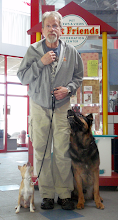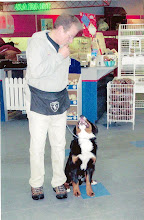Spring and summer are puppy season, when those cute, cuddly balls of fur arrive for the first time in many homes. While we all love puppies, those puppy behaviors - like jumping up and nipping - aren't so adorable coming from a 75 pound dog! That's why Best Friends professional trainers recommend beginning to train your puppy as soon as he arrives in your home.
Learning the basics
Every puppy needs to learn at least the four basic obedience commands: come, sit, stay, and down. Choose a time when your puppy is relaxed, and a quiet area with few distractions. Early training sessions should be short; it's better to spend a few minutes with a puppy several times a day than to try to sustain his interest for a single long period. Start with the "come" command, which is critical for your pet's safety. Best Friends trainers recommend using the leash method. Begin by putting a collar on your puppy. Once he's accustomed to wearing it, attach a leash and standing several feet away, say "come", and gently pull him towards you. As he reaches you, praise him, using a happy tone of voice. Gradually, your puppy will begin to associate the word with the action and you won't need to pull on the leash. Once that happens, practice the command without a leash. Remember to give him lots of praise when he responds by coming to you. Don't try to accomplish too much at once. End each session on a high note, just after your puppy has successfully performed a command. This will make the training process enjoyable and something to which puppy will look forward. As you see your puppy make progress with the first command, you can move onto to "sit" and then "stay". Once puppy has mastered these commands, you can begin to teach him to walk properly on a leash.
Getting started
There are many good books on puppy training, but best way to get your puppy's training started is by joining a group class. Training classes also provide an opportunity to socialize your pet, which is important to his emotional well-being. Dogs that aren't adequately socialized can become shy and fearful. In fact, many behavior problems in older dogs stem from lack of adequate socialization as a puppy. Check your local Best Friends center for class schedules.
Saturday, July 10, 2010
Subscribe to:
Posts (Atom)






